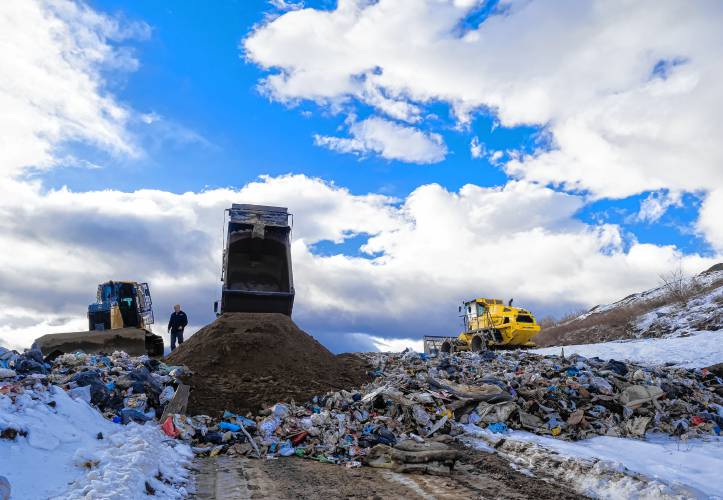Bills target out-of-state trash

Conway public works staffer Tim Shackford oversees the pouring of dirt over the garbage dumped the in the city landfill on Wednesday, January 18, 2023. GEOFF FORESTER
| Published: 01-01-2024 12:06 PM |
New Hampshire has become a dumping ground for out-of-state trash.
But that could change during the upcoming legislative session as lawmakers try to slam the brakes on trucks bringing waste from beyond state borders.
One bill takes on the Interstate Commerce Clause that currently prevents the state from laying restrictions on privately owned landfills from taking in out-of-state waste. Meanwhile, a second bill proposes a measure that limits the out-of-state trash a landfill can accept.
Under a bill sponsored by state Rep. Peter Bixby, a Democrat from Dover, new landfills would be barred from private ownership, reserving ownership rights exclusively for the state, county, or town or city, while still permitting private entities to operate these landfills.
By prohibiting private ownership, the legislation (HB 1145) would give the state authority to restrict the types of waste accepted, navigating around potential conflicts with the Interstate Commerce Clause. This could involve targeted restrictions similar to Massachusetts’ bans on discarding textiles and mattresses. The broader scope even opens the door for an outright ban on out-of-state trash.
However, this proposed regulation would not affect existing privately owned landfills – Turnkey landfill in Rochester and North Country Environmental Services landfill in Bethlehem.
Mount Carberry Landfill in Berlin, although publicly owned, accepts out-of-state trash.
“This wouldn’t necessarily eliminate all out-of-state trash, but it would allow control at the state level for what trash is being accepted,” said Bixby. “If it was a municipal landfill, then the municipality would have control. So it gives a level of control that we don’t have right now.”
Article continues after...
Yesterday's Most Read Articles
The state would need to put out a request for a proposal to hire a third-party vendor to manage the day-to-day operations of the landfill but the state will also have the power to make recommendations on the tipping fee.
The bill language allows private companies to operate the landfill and that was a decision made for Republicans also to support the bill.
“I think it’s sensible because there are some things which the government does well, but there are other things which I think private industry can do more effectively,” said Bixby.
Almost half of New Hampshire’s trash comes from out-of-state, with 900,000 tons dumped in commercial landfills in 2020. A new bill filed, resulting from a committee established to study landfills servicing unlimited areas, may alter the state’s landfill landscape.
Rep. David Rochefort, a Republican from Littleton and a member of the study committee, is pushing for a bill (HB 1632) that aims to cap the out-of-state trash accepted by landfills at 15%. While this regulation won’t impact already permitted landfills, it would apply to all landfills, whether publicly or privately owned, after the bill’s passage.
“People don’t want New Hampshire to be the dumping ground of New England,” said Rochefort. “It benefits a few corporations. But aside from that, it actually is a detriment to more people than it is a benefit.”
The study committee also recommends placing a moratorium on the construction of new landfills until the state has improved its solid waste management plan.
“If we reduce and eliminate out-of-state trash, we don’t need to open another landfill in this state for at least two decades and that number is a minimum,” said Rep. Nicholas Germana, a Democrat from Keene and another member of the study committee.
During this year’s legislative session, just two bills successfully passed out of over a dozen proposed to establish effective solid waste management measures in New Hampshire.
Bills addressing surface water setbacks for landfills and permits for landfill siting did not pass.
However, there is optimism among lawmakers that these two bills addressing out-of-state trash could gain approval due to bipartisan support.
“I know that there are Democrats and Republicans who will support the bills. In both of these cases, it’s definitely a bipartisan effort,” said Germana. “So I’m cautiously optimistic that we can get at least the bill on the publicly owned landfills to the governor’s desk.”







 Mullet madness: Young man who died in motorcycle accident remembered at local fundraiser
Mullet madness: Young man who died in motorcycle accident remembered at local fundraiser ‘Entire paradigm has to shift’: Majority of parents express support for phone ban, but predict rocky rollout
‘Entire paradigm has to shift’: Majority of parents express support for phone ban, but predict rocky rollout New Hampshire committee seeks to prevent domestic fatalities like murder-suicide in Berlin
New Hampshire committee seeks to prevent domestic fatalities like murder-suicide in Berlin ‘A little piece of everything I like’: New Pittsfield barbershop brings more than a haircut to downtown
‘A little piece of everything I like’: New Pittsfield barbershop brings more than a haircut to downtown
